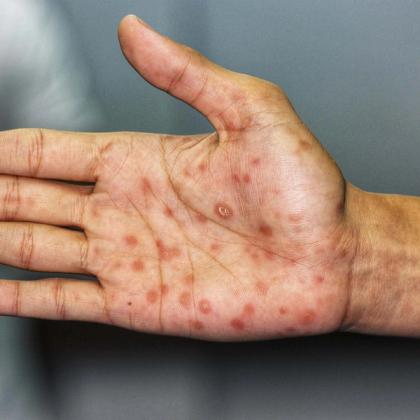Syphilis is a sexually transmitted infection caused by the bacterium Treponema pallidum. Known for its varied symptoms and potential to progress through multiple stages, syphilis can have serious health consequences if left untreated, affecting organs like the heart, brain and nerves. The infection spreads primarily through direct contact with syphilitic sores, which typically occur on the genital, anal or oral areas. Though syphilis was once thought to be largely under control, its prevalence has resurged in recent years, prompting renewed focus on prevention, early diagnosis and effective treatment. In this episode, Dr Roger Henderson discusses new syphilis guidelines issued by the British Association for Sexual Health and HIV and how these impact treatment in primary care.
Key take-home points
- Syphilis is caused by infection with the spirochete bacterium Treponema pallidum and is transmitted by direct contact with an infectious lesion or by mother-to-child transmission via the placenta during pregnancy.
- Approximately one-third of sexual contacts of individuals with infectious syphilis will subsequently develop the disease.
- In heterosexual patients the site of bacterial entry is typically genital.
- Among gay and bisexual men transmission may be through oral–anal or genital–anal contact.
- It may be categorised as early (primary), secondary and late (tertiary), with a latent stage following secondary syphilis.
- Primary syphilis refers to local infection with a typical incubation period of 2–3 weeks (the range is 9–90 days).
- Secondary syphilis is generalised infection, with an incubation period of 6–12 weeks (the range is 1–6 months).
- Following secondary syphilis there is a latent stage. Early-latent syphilis refers to asymptomatic syphilis of less than 2 years' duration and late-latent syphilis is asymptomatic syphilis for greater than 2 years.
- Tertiary (late symptomatic) syphilis can be split into cardiovascular syphilis, neurosyphilis and gummatous syphilis.
- Early congenital syphilis occurs within the first 2 years of life.
- Late congenital syphilis occurs in children older than 2 years.
- Investigations should include a screen for all sexually transmitted infections (including HIV) as well as investigation for other possible diagnoses.
- All patients with neurological signs or symptoms and those who fail treatment should have a lumbar puncture and neurological imaging if appropriate.
- Serology testing should be performed in all patients with signs or symptoms of syphilis. This requires the use of both treponemal (specific) and non-treponemal (non-specific) tests with the usual approach being a treponemal test as the initial serological test, followed by a non-treponemal test if the treponemal test is positive.
- Treponemal tests include Treponemal enzyme immunoassay, T. pallidum haemagglutination assay, fluorescent antibody absorption and immunocapture assay.
- The T. pallidum particle agglutination assay was withdrawn from the UK in 2022 due to regulatory requirements.
- Following a positive treponemal test, a non-treponemal test should always be undertaken to confirm the diagnosis, and to provide evidence of active disease or re-infection. Non-treponemal tests include the rapid plasma reagin and the Venereal Diseases Research Laboratory tests.
- Treponemal-specific tests remain reactive lifelong and so are unable to differentiate between active and past infections, or monitor response to treatment.
- Treatment should be within a sexual health clinic, with enquiries about sexual contacts.
- The treatment of syphilis infection is curative with appropriate antibiotics.
- Parenteral benzylpenicillin is the first-line drug treatment for all stages of syphilis with the preparation (such as benzathine, procaine, aqueous), dose, and length of treatment determined by the stage and clinical manifestations.
- When using antibiotics in syphilis, the Jarisch-Herxheimer reaction must always be remembered as a possible effect. This is an acute febrile illness with headache, myalgia, chills and rigors but which typically resolves within 24 hours and does not require cessation of antibiotic treatment.
- The purpose of follow-up is to identify re-infection and document effective treatment and partner notification.
- Treatment failure is characterised by a four-fold or greater increase in non-treponemal test titre, recurrence of signs or symptoms and exclusion of re-infection.
- Re-infection should be re-treated and sexual partners should be screened and epidemiological treatment considered.
Key references
- Kingston M, et al. Int J STD AIDS. 2024:9564624241280406. doi: 10.1177/09564624241280406.
- Tuddenham S, Ghanem KG. BMC Infect Dis. 2015;15:351. doi: 10.1186/s12879-015-1028-3.
- Anderson J, et al. Genitourin Med. 1989;65(4):239-243. doi: 10.1136/sti.65.4.239.
- Janier M, et al. J Eur Acad Dermatol Venereol. 2021;35(3):574-588. doi: 10.1111/jdv.16946.
- Gjestland T. Acta Derm Venereol Suppl (Stockh). 1955;35(Suppl 34):3-368; Annex I-LVI. doi: 10.2340/00015555343368.
- Workowski KA, et al. MMWR Recomm Rep. 2021;70(4):1-187. doi: 10.15585/mmwr.rr7004a1.
- CDC. https://www.cdc.gov/syphilis/about/index.html.
- Reddy Belum G, et al. Travel Med Infect Dis. 2013;11(4):231-237. doi: 10.1016/j.tmaid.2013.04.001.
Create an account to add page annotations
Add information to this page that would be handy to have on hand during a consultation, such as a web address or phone number. This information will always be displayed when you visit this page
